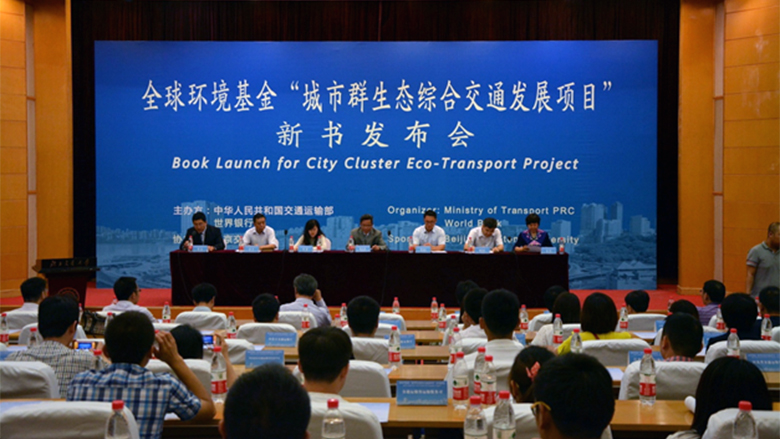Beijing, July 4, 2016 –The City Cluster Eco-transport Project, supported by the Global Environment Facility (GEF), celebrated its completion with a book launch and an exhibition on June 17, participated by representatives of provincial planning departments and designing institutes. More than 800 people visited the week-long exhibition in the Beijing Jiaotong University.
Executed by the Ministry of Transport of China, the project promoted and demonstrated multi-modal transport integration in city clusters or mega regions to improve transport efficiency, save energy and reduce emission. It took a two-pronged approach, developing transport policy and planning guidelines while doing pilot projects.
The five books launched include three transport planning studies on China’s northeast, west central and south central regions respectively, a practice guideline on integrated transport planning, and a methodology and practice guide on energy-saving and emission evaluation. The project also organized several workshops to disseminate the knowledge around the country.
In addition, the project developed two passenger terminals in Changsha, Hunan Province. Fully integrated with other transport modes, the two terminals demonstrate not only smoother passenger transfer but also greater emission reduction.
“City-cluster development is a key topic at the national level, with great impact on the quality of urbanization. City-cluster planning should be innovative, cooperative, open and ecological. Eco-transport development will contribute to sustainable urbanization in China,” said Sun Mingzheng, a deputy chief engineer of Beijing Transportation Research Center.
“The research findings were applied in pilot activities, and the experience was summarized in these books. We hope that they will provide a guide for city cluster eco-transport planning, transport-oriented development, and integrated land use in the future,” said Zhang Dawei, a deputy director-general of the Comprehensive Planning Department, Ministry of Transport.
“These reports and guidelines prepared by the Ministry of Transport will be disseminated and shared with a large audience on the TransFORM website, and discussed online and in workshops on city cluster transport,” said Reja Binyam, World Bank’s Transport Cluster Leader for China and Mongolia.
The book launch and exhibition was part of the World Bank’s TransFORM activities on urban transport. TransFORM is a knowledge platform jointly developed by the World Bank and China’s Ministry of Transport to share the country’s experience and know-how gained from 30 years of developing a large national transport network.
Established in 1991, the GEF is today the largest funder of projects to improve the global environment. It provides grants to developing countries and countries in transition for projects related to biodiversity, climate change, international waters, land degradation, the ozone layer, and persistent organic pollutants. The World Bank is one of the implementation agencies of GEF.

